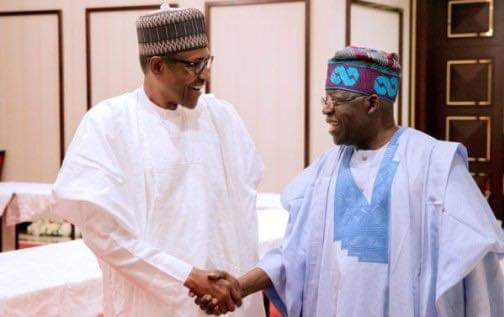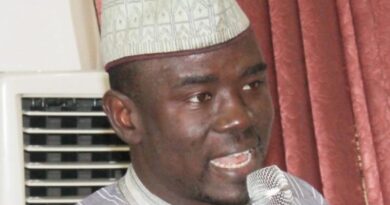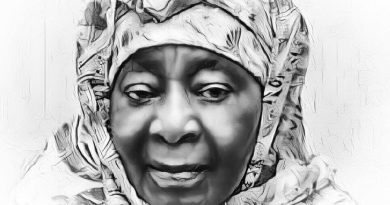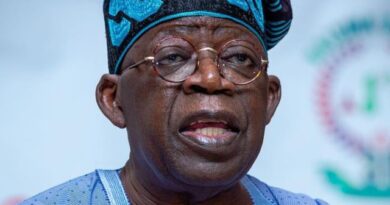The President Nigerians Need In A Time Of Adversity
By Abdullah Adeyanju Binuyo
Bad leaders do not just fall from the sky , they are elected by good citizens who do not vote, Your vote is your voice. By not voting you lose the right to. complain about bad leadership and bad governance.
Nigeria, already the poverty capital of the world, has been plunged over the economic cliff with the government’s recent decision to change the currency – by redesigning the Naira or Naira recoloration for political rather than economic reasons. If nothing else, it teaches us a lesson in selecting leaders. Leadership choice should not be about the aspirations of a few but rather by the consequence of their competence .
This, therefore brings forth the question. Who should you vote for to be President of the Federal Republic of Nigeria on Saturday? As you go to vote, ask yourself, what kind of person do we need to lead us through these troubled times? Let your head lead your emotions when casting your vote.
Think about the very serious challenges facing our world and our country. Our economy is shrnking as fast as our population is rising. . Rising interest rates and inflation around the world makes even basic foodstuffs like garri too expensive for the average people. They make it virtually impossible to borrow or pay back loans. Nigeria got no windfall benefit from post COVID 19 pandemic oil price boom. In fact, in one way or another we have been living with austerity for most of the Buhari administration. The war in Ukraine has added its own misery to our suffering. The exodus of Generation ‘Japa’ started out as trickle as this administration took power in 2015 and has now became a flood as the economy worsened. Technically qualified Nigerians with their families rank among the top 3 countries granted student visas to the United Kingdom. Our urban youth started voting with their feet long before they got PVCs for this election.
Who then can lead us out of this economic adversity?
If we are honest with ourselves, all three leading candidates have risen to the governance challenges of their time. Among former Governor Peter Obi’s touted successes are the educational achievements in Anambra state attributed to his policies. While much fanfare has been made about his frugality, financial prudence investing state money and savings, the current governor of Anambra state professor Charles Soludo (himself a former Central Bank Governor) has raised issues contesting the nature and value of those achievements.
Former Vice President Atiku had a ring side seat as the Obasanjo administration privatised state assets and liberalised the economy, leading to a turbo charged 15% growth in GDP in 2002, a remarkable feat that has not been matched since. As the officer responsible for economic policy the former vice president shares much of the credit. Among Vice President Atiku’s other touted achievements is strengthening transparency through the creation of ‘due process’ and the Bureau of Public Procurement. Both have demonstrated capacity. But under what type of adversity?
While Governor Obi faced legal and political adversity in the form of court cases and impeachments, Vice President Atiku was squaring off in the courts and the party with President Obasanjo. neither can claim that the federal government posed an existential economic and constitutional threat to their state in the way the Governor Tinubu experienced. And while both triumphed in their personal political struggles it remains to be seen if the legacy of their triumph extended to their states.
Perhaps the more benign enabler of performance for both former Governor Obi and former Vice President Atiku respectively is that they governed during 8 years of relative ‘fat’ with high oil prices and government revenue surpluses. Some of these surpluses ended up in the Excess Crude Account, which by 2007 exceeded $37 billion. . Even the financial crash of 2008 was cushioned by spending the savings in the Excess Crude Account. Dr. Ngozi Okonjo-Iwaela then minister of Finance, recounts how then Governor Obi counselled for investing the funds in the Excess Crude Account than share it to ameiolate the suffering of Nigerians. In short, times were good when they were last in power.
In these good years of fat, Lagos state was financially marooned as federal allocation of funds to local governments were withheld for several years. Other punitive measures, both financial and non-financial, were directed at Lagos state to the point where the Federal government had more court cases against Lagos state than all other states combined. The more adversarial the federal government became, the more innovative Lagos state became. A time of plenty for most states, including the introduction of 13% derivation for oil producing states, was a time of adversity for Lagos. Lagos state under Asiwaju Bola Ahmed Tinubu became a lean and agile government with a policy entrepreneurial instinct. Its small land mass and its diverse population were its riches. No other Presidential candidate’s leadership was forged under such adverse conditions. No other Presidential candidate has experienced that level of governing hardship. No other candidate’s presidential credentials could be more tailor-made for these times.
Much has been said of how Asiwaju improved Lagos’s internally generated revenue. Much less has been said of how he improved the delivery of governing services. Security in the state when Asiwaju took office was dire. It was not uncommon to see festering corpses on the streets of Lagos in 1999. It was not uncommon to wait years to receive governor’s consent on simple property transactions. Court cases often took years, even decades. The reforms he instituted were comprehensive. Technology was introduced into the courts as well as in government, as were innovative informal dispute resolution mechanisms. Ghost workers were purged as service conditions were improved for civil servants and judiciary. The Tax system was streamlined. Major roads in Lagos were beautified with gardens, and public-private partnerships were entered into to maintain the scenery on these roads in return for advertising and marketing as can be seen on Ajose Adeogun street in Victoria Island and other roads in the state. All of these achievements were made while the Federal government was tying one of the state’s financial and constitutional arms behind her back.
The difficult conditions under which Lagos state operated then mirror our experiences throughout Nigeria today. We all feel nervous as a result of insecurity. Lagosians did so then. Asiwaju surged resources and equipment to police, creating a Policre rapid response service. . We are all exhausted from exercising patience in the hope of improvement. We are all frustrated as government does not seem to present in our lives. . Lagosians did then. Asiwaju brought government to the people in Lagos. Administration officials had name tags on them so people would know who they were. Even their phone numbers were published in newspapers so they could be reached by ordinary Lagosians.
In terms of economics, today we spend more money servicing interest on our debt than we make in revenue. Much of that debt was used to finance the petrol subsidy or salaries. We have, as economists say, fallen off the ‘fiscal cliff’, meaning we don’t generate enough taxes to pay our way. Lagos state due to economic strangulation by the federal government was in a similar position to the federal government today but used World bank and other loans to build infrastructure to accelerate its economy. If we are to go to the international community for a bail out, which of the candidates has more hands-on experience negotiating with international financial institutions
Finally, returning to the currency change, Naira redesign or “Naira re-coloration”, this has added economic insult to injury for Nigerians. The short term impacts of this policy has dislocated the economy and we are all suffering for it.. While both Atiku and Obi are busy either lauding this policy or remaining conspicuously silent, they both know how damaging to the economy weaponising the currency for political ends can be.
We don’t need to go abroad to see the potential long term impacts of such a policy. Just go back to 1984 in Nigeria when then Head of State General Muhammadu Buhari introduced new Naira notes. Up until that currency change in 1984, anyone could take Naira to London or America and change it into Dollars or pounds abroad. Businesses could open Letters of Credit with their banks in Nigeria and not be required to cash back the Letter of Credit with Dollars. Once the decree to change currency came into force, over night the Naira was no longer freely convertible. We have lived with those consequences ever since, making doing business in Nigeria and foreign direct investment into Nigeria more difficult.
The impact of this Naira recoloration may well endure beyond this election. Since it was introduced for political reasons in this election cycle, it will be a source of concern every election going forward. Over time this may erode confidence in the currency as a store of value and medium of exchange. If there is more than one value for the Naira (new notes more valuable than old notes), the prospects of further erosion of trust in the currency are more real than imagined. This is happening in a time of block chain and crypto currency, that present reliable alternative and (under these circumstances) preferrable means of exchange to the Naira for doing business in Nigeria. In Sokoto ( Ilela local Government ) and other border regions transactions are right now being conducted in CFA (Francophone currency). Messing with the currency for political ends effectively undermines the sovereignty of the Federal Republic of Nigeria. To solve this litany of travails and tears, we get to choose between Peter, Abubakar and Bola. Peter and Abubakar speak volumes about situational principles by not speaking truth to power when the need arises in a desperate bid for power. Bola by contrast soldiers on accustomed to such behaviour from Federal government.
While Peter may be the rock and beloved son in whom the late Ikemba Nnewi was well pleased, and while Abubakar may be true to his illustrious namesake- As-siddique, it is the trials, tribulations and leadership of prophet Yusuf in the Qur’an or Joseph in the Bible that reflects the Nigerian condition today, and leadership and endurance qualities required for the president of this time. The very same conditions under which Asiwaju has been prepared for presidential leadership.
After 8 years of growth under Obasanjo, we experience 5 years of record oil prices under YarAdua/Goodluck, until the oil price collapse in late 2014. We’ve experienced 8 leaner years under Buhari, including the oil price collapse during COVID19, and face even more adversity going forward.
The man with the vision and the management skills to see us through this adversity and lead us to the foothills of the promised economic land is the one that should get your vote. The only one with that record of leadership is Asiwaju Bola Ahmed Tinubu. He gets my vote. Put aside your biases and emotions and look dispassionately at the conditions under which each candidate has achieved the great strides his supporters are claiming. If you do that, you will come to the same inescapable conclusion as I have that the president we need for this time is Asiwaju Bola Ahmed Tinubu . He deserves your vote.
Binuyo is the former Deputy Chief of Staff to the former Governor of Osun State




